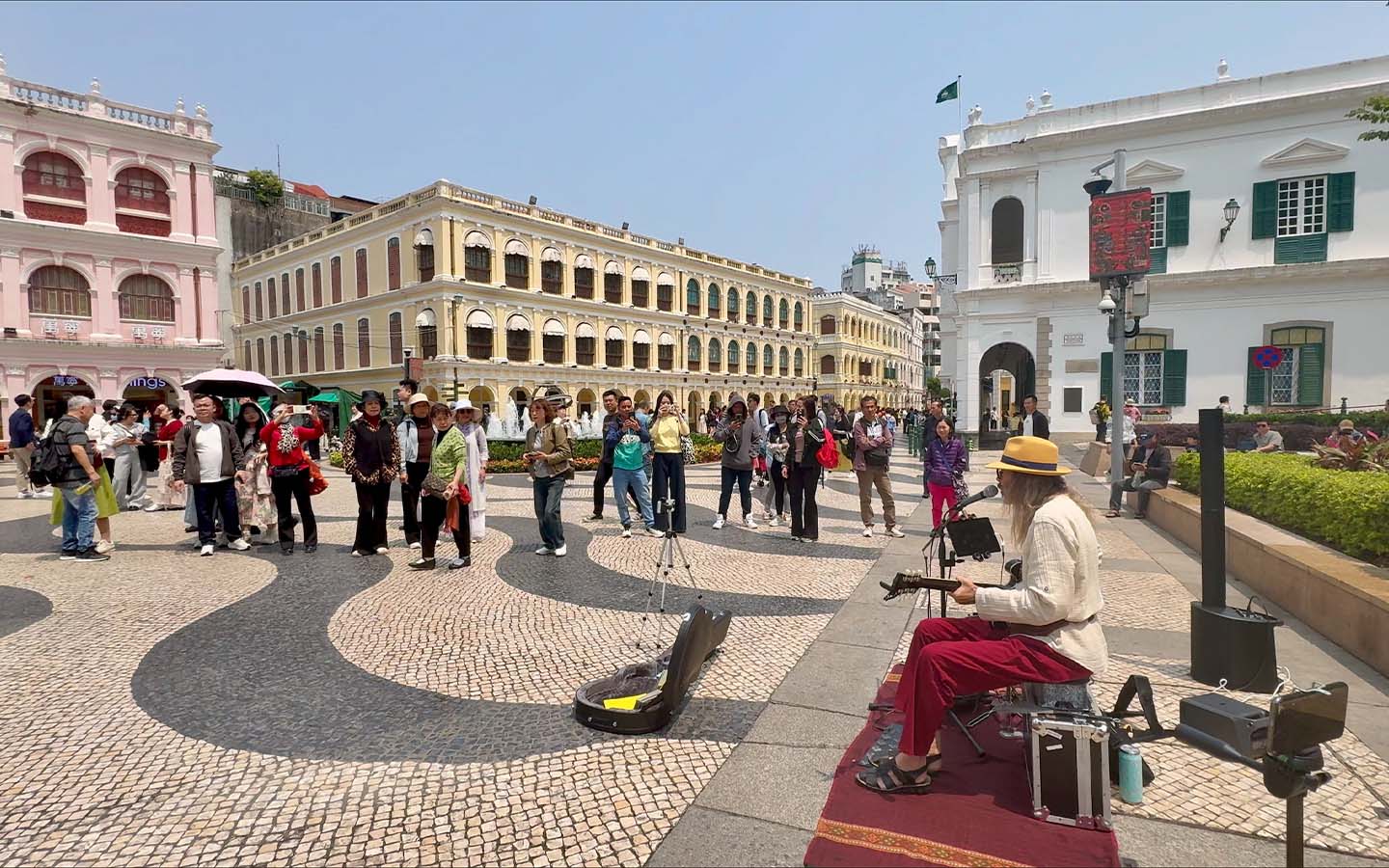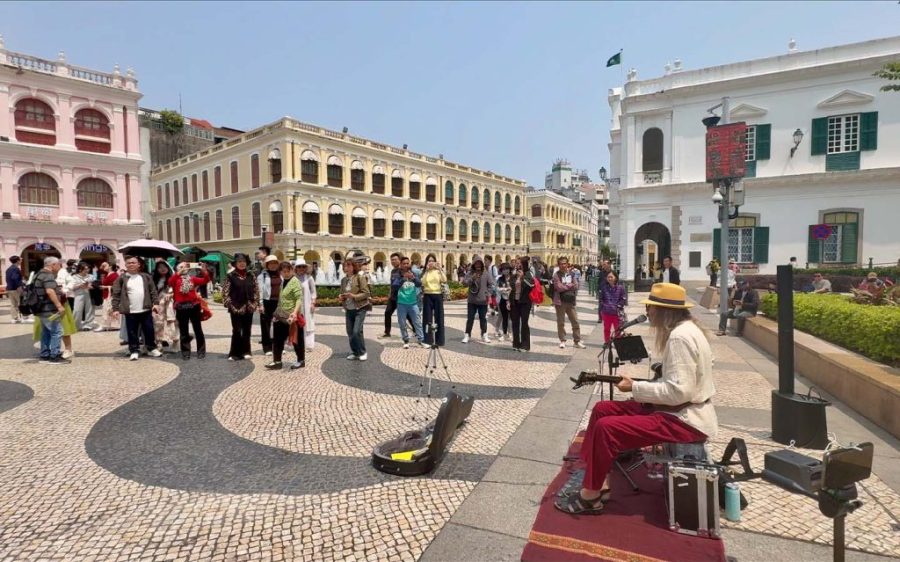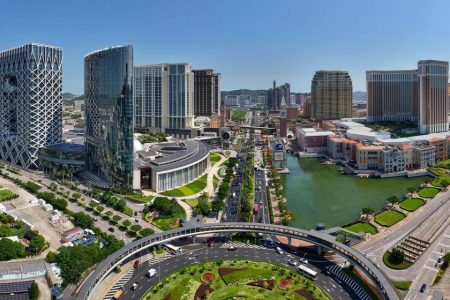Markus Koehorst or Markus K, as he is better known to his legion of YouTube followers, thought he had seen it all after nine years of busking around the world. The 67-year-old one-man blues fusion band had experienced run-ins with the law before for performing on the streets without a permit.
“It happens every now and again that the police arrive and they say – usually it’s very respectful – you can’t play here or somebody called,” Markus explains. “I apologise, find a place where I’m welcomed and that’s usually the end of that.”
[See more: ‘Music is a friend that accompanies you through life.’ Andrea Bocelli talks with Macao News]
As a matter of fact, the Dutch musician says he has only been fined twice during his nearly decade long career as a busker. However, a recent encounter with the Macao authorities during a performance greatly disturbed the artist, leaving him and his partner deeply traumatised.
As Macao seeks to shed its casino image to become an international tourism hub and “city of culture,” Koehorst’s experience suggests that local bureaucrats have yet to acknowledge the value of street performance as a cultural asset.
Kicked out of Macao for busking
On 2 April, after spending a week relaxing in Macao, Koehorst selected a busy spot adjacent to the fountain in Senado Square to stage a street concert.
“It was all very nice – people very much enjoying it,” Koehorst tells Macao News. “I was playing probably [for] about 25 minutes, and then I decided to have a break, and then the police came over, and I asked them whether there was a problem.”
According to the busker, the officers instructed him to stay put before transporting him to the local police station, with the whole ordeal lasting for “about 12 hours.”
“This has never happened to me in my life where they [the police] wouldn’t explain anything at all,” Koehorst says, adding that neither he nor his partner were allowed to use the bathroom without being accompanied by the police. Nor were they permitted to go out for food.
Eventually, the pair were escorted out of Macao to mainland China, but not before being shouted at by an “extremely rude” immigration official for breaking the law, and being escorted back to their hotel to pack their belongings by three police officers.
“It was the strangest thing I’ve ever experienced, just because I played my guitar on the street and made people happy with my music,” Koehorst says, pointing out that he and his partner “were treated like criminals.”
“Obviously, a lot of [public] resources went into that. But there was never a legal process or anything like that. We were never given a piece of paper explaining what was going on – absolutely nothing.”
Is Macao’s busking permit system broken?
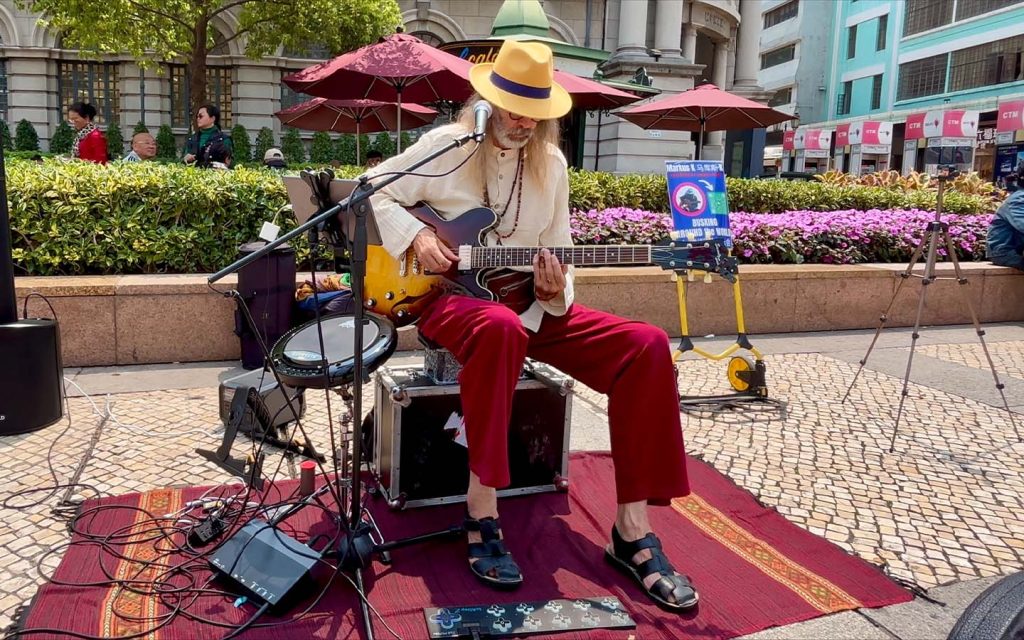
Koehorst’s unpleasant busking experience in Macao sharply contrasts with his time in mainland China and Hong Kong, where he was permitted to play freely without police interference. Part of the reason for this difference stems from the fact that Macao’s two regional neighbours adopt a comparatively laissez-faire approach to street performances, with no overriding regulatory framework in place for street performers.
By contrast, Macao tightly manages street performances through a busking programme that was introduced by the Cultural Affairs Bureau in 2016. Under this initiative, street performers are required to apply for a busking permit that allows them to perform in seven designated venues – Anim’Arte Nam Van, the Taipa Houses, Mount Fortress Garden, Barra Square, Ka Ho Village of Our Lady, the Iec Long Firecracker Factory site, Lai Chi Vun Shipyards and Travessa do Aterro Novo Square.
While seven venues sounds plenty for a city as small as Macao, the reality is the programme places all manners of restrictions that make it difficult for performers to thrive. A quick glance over the current guidelines will show that many of these venues only allow performances on the weekends or public holiday and for periods of no longer than two hours per location.
[See more: Here’s why Macao won’t be able to host a Taylor Swift concert anytime soon]
Angus Lou, a Macao resident who began licensed busking in the city in 2020, also points out that the availability of busking locations is “very unstable,” as some of them “open and close all the time” due to various reasons such as the staging of events onsite.
Another major hurdle that Lou highlights is the prohibition of amplifiers in over half of the legal busking spots, including Barra Square, the Taipa Houses and Lai Chi Vun Shipyards.
“In the past, we may have gone to perform in Barra whenever it was Chinese New Year because there’s a lot of people there,” he says. This is no longer the case, with the singer citing the government’s loudspeaker ban as the reason. “If we’re busking, singing with a guitar or putting on a show without a loudspeaker, it’s basically very difficult to perform because we’re too quiet with all the noise around us.”
In the case of the Taipa Houses, Lou says that his friend gave up busking in the area after the government enforced the no amplifier rule there without offering any explanations or providing guidelines on the appropriate sound level.
Exacerbating the problem is the lack of permissible busking areas with very high levels of foot traffic such as Senado Square – a factor that greatly reduces street performers’ level of exposure and amount of donations collected. “I don’t know what the government’s considerations are [for not including Senado Square],” Lou says. “Perhaps there are too many people and they’re afraid of crowding or perhaps they’re afraid there’s too much money involved and no taxes are being paid [by performers].”
The argument for unlicensed busking in Macao
Despite the shortcomings of Macao’s busking system, Lou recognises the value of having regulatory measures in place, noting that designated busking spots can prevent loud noises from disrupting the public. He also adds that the standards for obtaining a busking permit in Macao are not “particularly high,” and that the process only takes a few weeks.
For foreign performers such as Koehorst, however, waiting weeks on end for a permit is simply not feasible. Due to the restrictive and impractical nature of such busking rules, the Dutch musician has no choice but to flaunt them.
As an example, Koehorst mentions Germany, his favourite place to go busking. “It’s actually in the law [in Germany] that you can’t use an amplifier, which is very restrictive,” the performer says. “It means that if you want to play on the street, you end up beating the hell out of an old guitar, shouting at the top of your voice for someone to hear you, which is not music.”
Although the Dutch musician acknowledges twisting the rules, he attempts to be “considerate” by controlling his sound level and not playing around schools or areas where people work. “I appreciate laws have to be there to protect the society, but then you have to use them with a little bit of discretion, in my opinion,” he says.
Is liberalising Macao’s busking permit system the answer?
Robbie Ho, a professor with the Education University of Hong Kong who studies street performance, holds a similar view to Koehorst on unrestrained artistic expression, in that he personally believes that “everybody should have the right to use [a] public space” and that setting rules “takes away the freedom, spontaneity and autonomy of the buskers.”
At the same time, however, Ho says he understands that buskers need to be managed because “without regulations, I don’t see how it’s manageable to negotiate or coordinate among the different stakeholders in the public space.”
One cautionary tale of unmanaged busking that Ho cites is that of the former Mong Kok pedestrian zone in Hong Kong’s Sai Yeung Choi Street South, which became a popular stomping ground for buskers following its inauguration in 2000.
“Over the years, more and more street performances populated the area and it became unmanageable towards 2017-2018,” Ho says. “There were ongoing complaints from the neighbours because on weekends, it would be flooded by street performances.”
[See more: What summer music festivals are on in Asia in 2025?]
According to The New York Times, over 1,200 noise complaints were filed by residents and businesses stationed on the pedestrian street in 2017, with the speaker noise hitting as high as 100 decibels – well above the 85 decibels that could cause permanent hearing damage.
Ho notes that as many as two dozen musical street performers with amplifiers would occupy the same street, resulting in a situation that was “unbearable” and “unmanageable.” Ultimately, the pedestrian street was shut down on 4 August 2018, following a 15 to 1 vote by the local council.
The dangers of granting too much freedom to buskers in certain contexts is not completely lost on Koehorst either, with the singer citing the example of England, which he says has laws that are “in favour of busking.”
“People are abusing it [England’s lax busking laws], and they’re using big sound systems,” he points out. “They’re too loud, and they’re playing too long and in the wrong places.”
A dynamic solution to licensed busking
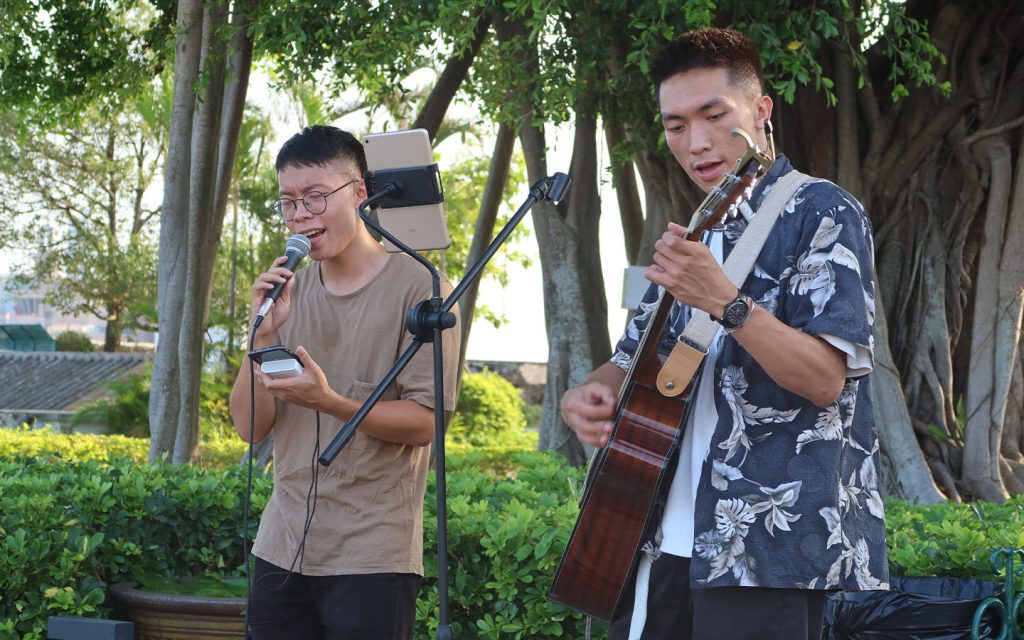
When asked how buskers should be managed, Ho says that “there’s really no simple answer,” adding that “the right answer will always be sitting in a grey area.” The street performance researcher does, however, suggest tackling the issue with a “dynamic solution.”
Ho says that such an approach would entail the authorities being flexible with how they implement a permit system. For instance, an area that is recognisably popular would require a permit that restricts how buskers use the area, whereas one that is unpopular would not need one.
The street performance researcher also suggests enforcing more restrictive licensing procedures during the peak seasons, when foreign buskers are more inclined to visit a particular location. During the off-seasons, these same rules could be relaxed to make the environment more accommodating to the performers.
The academic, however, acknowledges that this would require resources or more specifically “a dedicated department, institution or management agency unit to manage all these subtle details.”
What can Macao learn about busking from its neighbours and beyond?
Macao could also do well to learn from the experiences of other locations. Lou says that he would like to see the SAR look to Taiwan as a model, as the island has a “relatively well established” regulatory system, with buskers having to undergo an exam in order to acquire their permits.
Unlike their Macao counterparts, Taiwanese buskers in major cities also have access to a dedicated online busking platform that allows them to choose from a wide selection of busking locations and allocate their schedules accordingly.
Lou suggests that the Macao government should build on its licensing system by setting up a similar online platform, which will help to overcome scheduling overlaps between local buskers, ensuring that they don’t disrupt each others’ shows or occupy a space for too long.
[See more: I Ask, You Answer with Hong Kong-Macao musician Jun Kung]
At the same time, the Macao singer hopes that local authorities can increase the number of busking points and do more to promote busking in the community.
“The culture of [legalised] street performance is still very weak in Macao,” Lou says. He recounts a 2020 incident at the Nam Van Lake busking point, where a policeman told him that he wasn’t permitted to perform, even though he was holding a licence at the time.
“Even some government officials and law enforcement agents may not necessarily know about busking. They’re not aware that in Macao there’s actually an activity where you can receive money and sing using a speaker.”
What does Macao have to lose from sidelining buskers?
The state of Macao’s busking scene is unfortunate given that academic studies, including those conducted by Ho, have demonstrated that street performances can enhance people’s perception of a public space, and that areas with busking are viewed positively, provided the audience engages with the performers.
In the context of Macao, Lou says that when he performs at the Mount Fortress Garden or Anim’Arte Nam Van busking points, visitors will stop to enjoy his performances and take photos.
“I think most of the time [they stop to watch] because it’s very unique,” he says. “In mainland China, there are relatively few chances to hear a singer singing a Cantonese song or they recognise a particular Cantonese song like ‘The Glorious Years’ (光輝歲月) and ‘Boundless Oceans, Vast Skies’ (海闊天空).”
[See more: ‘No arms, no worries.’ Meet Macao singer Romeu Chao Asis]
Ultimately, the SAR government would be wise to overhaul Macao’s busking system, as offering a welcoming and open space for local and overseas buskers to perform aligns with its goal of transforming Macao into a “city of performing arts” and a hub for international exchange.
For now, though, there is work to be done. Although Markus holds no ill will towards Macao, describing his weeklong stay in the city as “pleasant enough,” he says his experience with the local authorities has tainted his feelings towards the territory and made him more partial to the mainland and Hong Kong.
“We find the good things in every place, but I don’t intend to go back to Macao because there’s a bad taste in my mouth,” the musician says.
